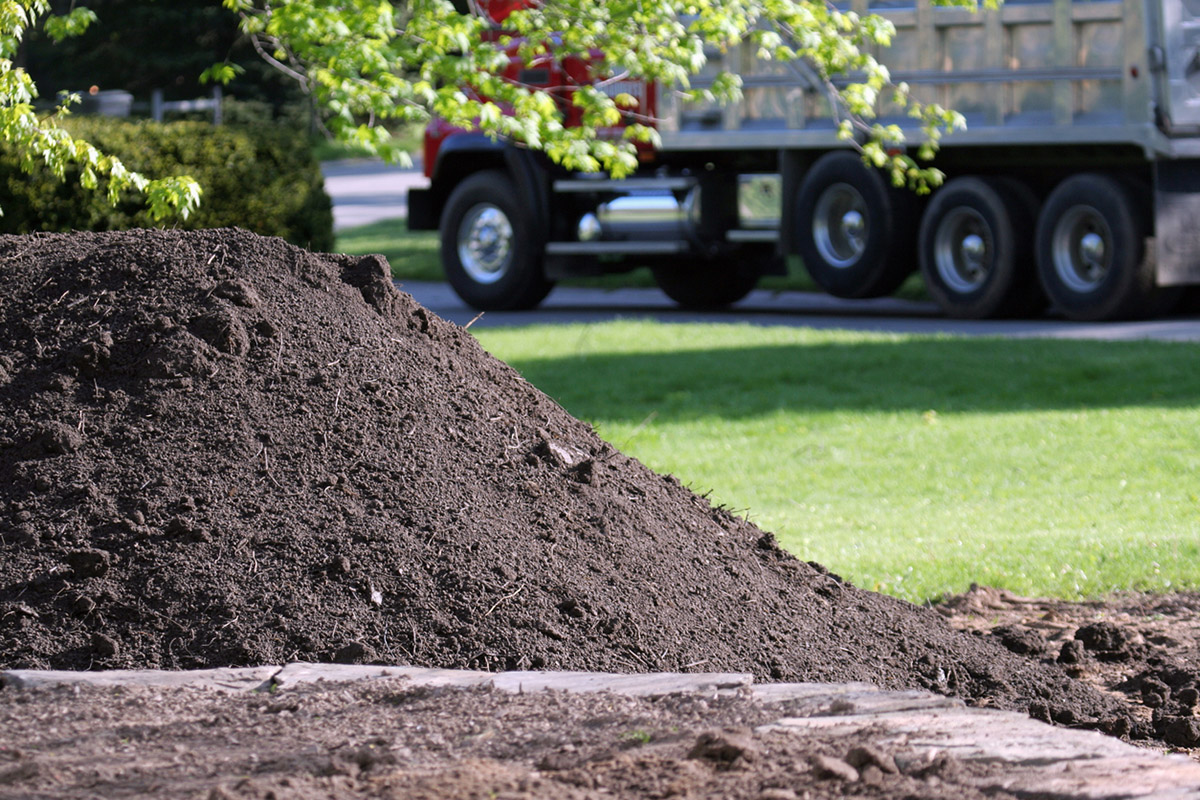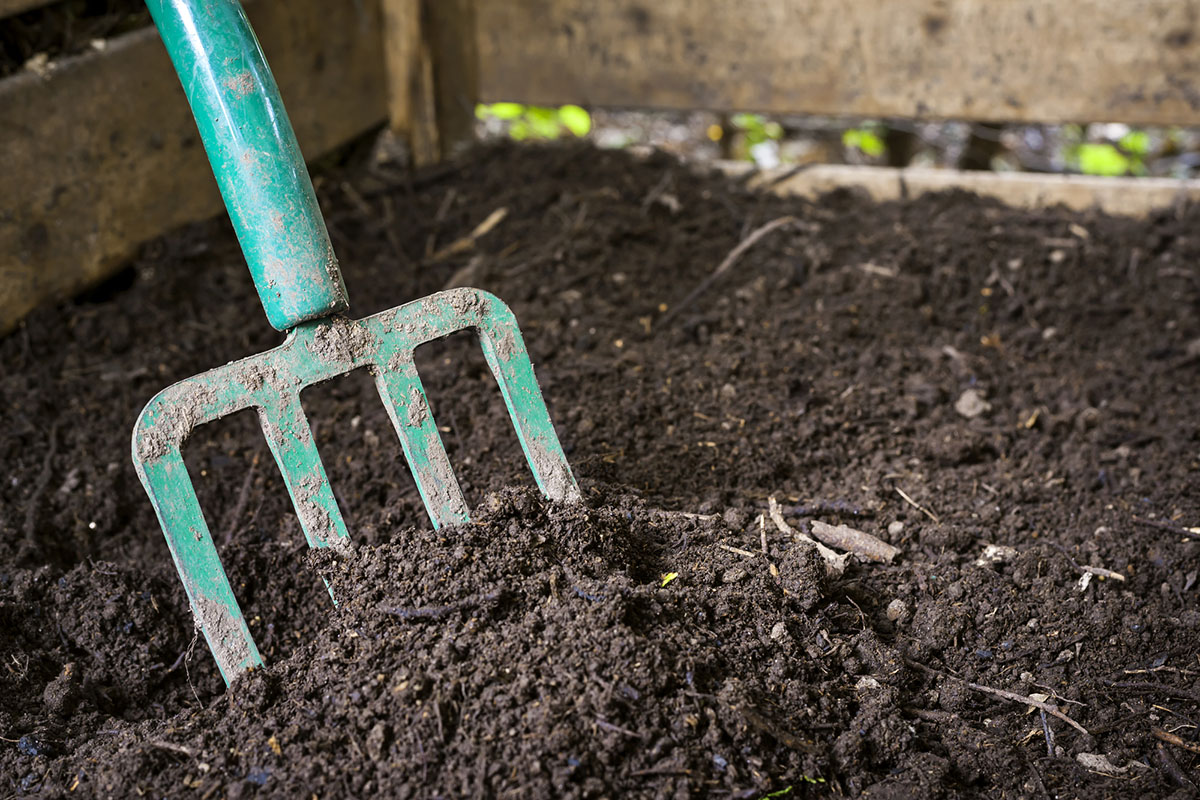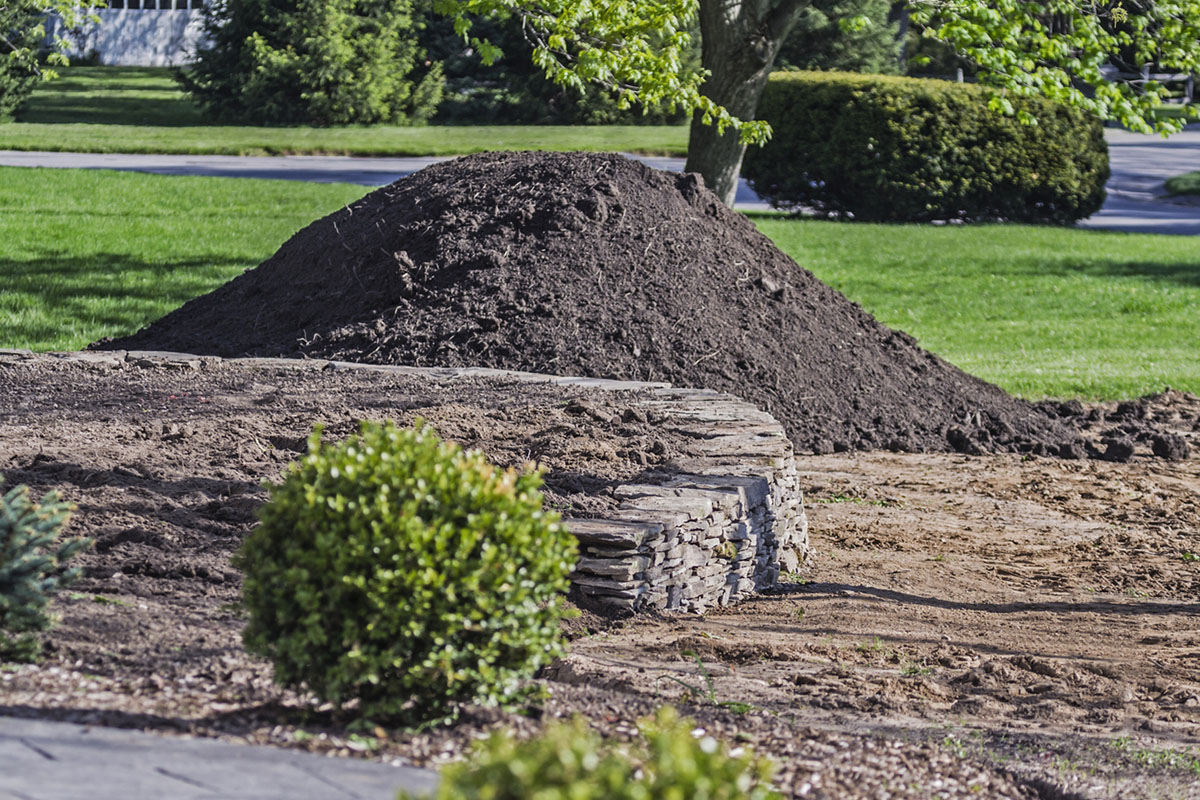

We may earn revenue from the products available on this page and participate in affiliate programs. Learn More ›
Whether you are an active gardener or a planting newbie, it is crucial to understand that topsoil helps plants grow. Topsoil is a blend of organic composted materials, natural soil, and sand. Locally sourced soil options include microorganisms and minerals that plants need to survive and can help keep pests at bay.
While you can make topsoil yourself, it can be a fairly lengthy and involved process. To save time or if a sizable amount of topsoil is needed for your backyard, it is recommended to hire a topsoil delivery service. Since many homeowners do not own a large enough vehicle to haul such a heavy load, ordering topsoil from a professional service by searching “topsoil near me” can save time and money when a company delivers it directly to your door.
The Cost of Getting Topsoil Delivered
According to Angi, homeowners can expect to pay an average of $750 for a truckload of bulk topsoil, dirt, sand, different types of mulch, or rock. A search of “topsoil delivery near me” will likely reveal costs between $300 and $1,200.
Delivery services calculate topsoil prices based on the size of the area to be filled; the average cost is between $12 and $55 per cubic yard. The exact costs will depend on moisture content, type of organic materials, geographic location, and packaging.
While many companies include delivery costs in their quote, some charge separate per-hour fees for hauling and delivery, usually $65 to $100. This fee varies based on the amount of material, the distance traveled, and the accessibility of the area where the topsoil will be unloaded. Homeowners can search for “soil delivery near me” to get a sense of topsoil prices in their ZIP code.
Should I choose topsoil delivery?
Whether building a few raised beds or paying to install a whole new lawn, you’ll need soil to get the job done. With a topsoil delivery service, homeowners can order their chosen type of topsoil and amount from a professional who delivers the heavy load directly to their home.
A topsoil delivery service will typically offer the following services:
- Soil purchase: A seasoned supplier offers quality topsoil or the mulch needed to tend to specific plants. When choosing the right topsoil delivery service, consider availability, quality, equipment, and the ability to deliver on time.
- Soil delivery and transportation: Many homeowners don’t own the proper type of vehicles that can hold large loads of soil. A delivery service has the right equipment to do this job for you. While some companies factor delivery into their total costs, others charge additional fees.
- Other landscaping materials: Besides selling and delivering topsoil, many companies can also provide dirt, sand, mulch, or rocks based on your gardening needs. Next time you search “garden soil near me,” “fill dirt near me,” or “where to buy topsoil near me” on the internet, check out a topsoil delivery service to help you find what you need.
- Other landscaping services: If you are hiring for a large yard project like installing sod, sometimes the best sod installation services will include soil and delivery in the cost of the sod installation.
Other Considerations
If you do not have the time or the right type of vehicle to haul a large soil order, consider hiring a topsoil delivery service near you. There are several benefits to hiring a service that directly handles topsoil orders and deliveries.
- Time savings: Topsoil delivery services can efficiently bring the proper gardening supplies right to your door. By hiring a service, you don’t have to invest your time and divert from your busy schedule to do it yourself. If you need next-day topsoil delivery, a service will likely be better equipped to meet your schedule than independent pickup.
- Staying under budget: By outsourcing delivery, homeowners can save money on the cost of transportation and fuel it would take to drive to the store and back home.
- Improving garden quality: Topsoil delivery services sometimes offer quality products that can help keep your garden healthy. By using their products, you’ll give your plants all the right nutrients for optimal growth.

Pickup vs. Delivery
Depending on the situation and an individual’s abilities, some homeowners can handle buying topsoil from a home improvement or garden supply store. If you are up to this task, your vehicle must be large enough and have the proper equipment to pick up and haul heavy soil. If you lack the time, skills, or equipment to take on this delivery yourself, hiring a professional service is likely to be the right call. When deciding whether to choose a professional service or tackle this project on your own, consider cost, experience, and necessary equipment before determining whether it is feasible. Also consider that you may require driveway cleaning to remove debris from your driveway once the topsoil has been spread across your yard.
How can I find the best service for topsoil delivery near me?
When hiring a professional topsoil delivery service near you, first conduct thorough research to find the right fit for your needs. Here are some tips to help you find a local topsoil delivery service that meets your requirements.
- Figure out how a company calculates cost, whether it’s based on garden area, geographic location, or amount of material. Some companies may include delivery fees in this total or it could be an additional amount you’ll need to pay.
- Understand the amount of topsoil needed for a job and how the soil is sold, whether it’s by the bag, by the scoop, or in bulk.
- Find out if the company has additional fees or signature requirements before the topsoil is delivered to your home.
- Be sure to ask about other jobs the company has taken on in the past and read online reviews.
- Check with neighbors, the best gardening services, and the best lawn care companies in your area to get recommendations.
Before hiring a topsoil delivery service, consider your garden size, the amount of soil needed, and any budget or time constraints.

How to Save Money on Topsoil Delivery
Topsoil is an essential element of any yard or garden, so it will necessarily account for a large part of your budget. But there are a few ways for the savvy homeowner to mitigate the cost of bulk topsoil delivery:
- Buy loose, bulk topsoil. Individual bags of topsoil can cost up to double the price of bulk topsoil.
- Consider asking a neighbor who needs soil if they would like to split the cost with you.
- Opt for less costly blends. If you already make your own compost or think that regular topsoil will work, don’t splurge on enriched garden soil.
- Call the best landscaping companies in your area to see where they source their soil.
- Calculate how much soil you need with as much accuracy as possible to avoid paying for extra soil. Likewise, if you underestimate how much you need you’ll have to pay for an additional delivery of topsoil and all the related fees.
- Try Hugelkultur, a German compost method where yard debris like leaves and wood are laid down at the bottom of a garden bed to enrich the soil. Since the compost takes up a good amount of space, you won’t need to use as much soil overall, which can potentially increase savings.
Questions to Ask Your Local Topsoil Delivery Service
Asking a local topsoil delivery professional the right questions can help sway decisions or ease any concerns you might have before purchasing. Here are some recommended questions to ask a topsoil company at different stages of the process:
Before hiring a topsoil delivery service:
- What types of topsoil do you have available? How is it sold?
- What’s your experience with topsoil delivery, and do you have references?
- How do you calculate the cost of the topsoil?
- Where will you leave the topsoil upon delivery?
- Is there a separate delivery fee, or is it included in the overall price?
- Do I need to be home during drop-off?
- Is there a minimum amount to be eligible for delivery?
- Is there an additional charge if I’m outside a certain radius?
- Do you have a fuel surcharge?
During the delivery process:
- Who should I call if there are any issues?
- If the delivery is running late, will you alert me of my order’s status?
- Do you need anything from me at the time of delivery?
After a delivery:
- Where can I leave a review or testimonial?
- Am I able to set up a standing delivery order moving forward?
FAQs
Hiring a topsoil delivery service can be a confusing process if you’ve never done so before. Here are some answers to homeowners’ common questions about what a topsoil delivery entails.
If you are wondering, “How much is a yard of topsoil?” you will first need to understand that topsoil is sold in cubic yards, so that is the unit of measurement you will want to calculate for. First, you’ll need to calculate the size of the area in cubic feet: multiply the length x width x height of the area you need to cover. Next, you will divide this number by 27 (the number of cubic feet in 1 cubic yard). For example, if you have a raised bed that is 5 feet in width, 10 feet in length, and 6 inches (or .5 feet) in height, you will multiply (5 ✕ 10 ✕ .5). The answer is 25, so the size of the flower bed is 25 cubic feet. You then divide 25 by 27, which is .9259. For this example, you’d likely round this number up to 1 cubic yard of soil needed for the raised bed. A single cubic yard of topsoil is usually between $12 and $55, so for five flower beds of this size you may spend anywhere from $60 to $275 on topsoil.
One dump truck can typically hold 10 to 13 cubic yards of topsoil. According to HomeAdvisor, a truckload of fill dirt and its delivery costs average between $150 and $450. Topsoil delivery services often calculate their costs based on garden size in cubic yards, moisture content and type of organic materials in the topsoil, and geographic location. While delivery can factor into the total price, some companies charge a separate delivery fee based on the amount of material, travel distance, and accessibility to the drop-off location.
Garden soil (not to be confused with potting soil) and topsoil are terms that are sometimes used interchangeably—so what is topsoil actually? Topsoil is an accumulation of organic matter, and it comes in a blended or organic form. Blended topsoil is a mixture of mineral material excavated from a construction site (such as compost), while organic topsoil contains shredded wood, moss, and peat. In contrast, garden soil is made of topsoil and a mixture of other materials or nutrients (often compost and fertilizer). Be advised that if you decide to opt for garden soil delivery, it will be slightly pricier than topsoil.
While homeowners can use compost to make topsoil, they are not the same products and don’t have the same purpose. Compost is a soil amendment made from rotted organic material that has decomposed and broken down. Compost allows the organic material to return to the soil for growing new crops, which completes the natural soil cycle. Topsoil contains organic matter, natural soil, sand, and other mineral particles.
When shopping for soil, you may notice the word “loam” being used. Loam describes soil that contains a generous amount of sand, silt, and clay (usually 52 percent or less sand, 28 percent to 50 percent silt, and 7 percent to 20 percent clay). A loam, or a topsoil that is “loamy” is desirable because it is balanced and drains well. Topsoil, on the other hand, is a very general term that simply refers to the top layer of soil in a yard. It may be prudent to ask about the composition of a topsoil before buying, try out some samples, and research what quality topsoil is best for the plants you intend to grow.
Most companies that offer topsoil delivery also offer mulch as one of their products. While topsoil is typically used for cultivating new plants, mulch is more like a protective layer for a yard or garden. Mulch is typically made up of organic materials that will decompose over time, contributing rich nutrients to the soil it covers. It can protect plants and soil from the elements, as well as improve the aesthetics of a yard. Mulch will typically need to be replenished every so often as it degrades.
